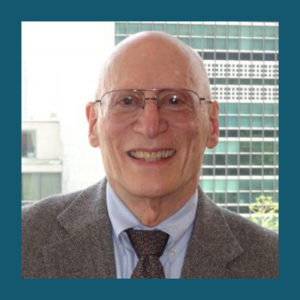Humanist EDge: An Interview with Charles “Chuck” Debrovner

Charles “Chuck” Debrovner, MD, is a board member of The Humanist Institute, the Mount Pleasant Cemetery, and Global Bioethics Initiative, as well as past president of the New York Society for Ethical Culture. Chuck was the former chair of the OB/GYN department at the French and PolyClinic Hospitals in New York and an emeritus senior attending physician at St. Lukes-Roosevelt Hospital. Though retired from clinical practice, he remains a clinical professor of OB/GYN at NYU Langone School of Medicine and is the medical coordinator for obstetrics and gynecology at the New York State Department of Health’s Office of Professional Medical Conduct.
Emily Newman: Why was The Humanist Institute (THI) developed?
Chuck Debrovner: The North American Committee for Humanism (NACH) was founded in 1986 to bring various branches of humanism together to find common ground between both religious humanists organizations (those of Ethical Culture, Unitarian Universalists, and Humanistic Judaism) and secular humanists (i.e., the Secular Humanist Society), and to train and educate humanist leaders. NACH created The Humanist Institute in 1982 as a vehicle to help accomplish these goals.
Newman: How did you get involved with THI?
Debrovner: My wife and I joined the New York Society for Ethical Culture in 1985, and I was president of NYSEC from 1988— 1994. I was eager to see that our professional Leaders [the proper name for Ethical Culture clergy] got the best training and therefore supported the goals of NACH. I served on the NACH board from 1988–1992. I then became co-president of NACH/The Humanist Institute when the two organizations merged together, and then continued as president from 1992–2006.
Newman: Why is THI important?
Debrovner: From the Ethical Culture point of view, The Humanist Institute is a wonderful organization to train Leaders. I was very anxious to see that our Leaders get the best training. It’s the first organization to bring people from all branches of humanism to be trained together, which I think is an important and dynamic educational experience, one that is academically rigorous and broad in scope. The institute has courses that train students to perform weddings, memorial services, baby-naming ceremonies, chaplaincy duties, and pastoral counseling. All are essential services for humanist communities throughout the country. I am very proud of THI’s dedication to providing these trainings.
Newman: Who would benefit from taking THI courses or attending our trainings?
Debrovner: Anybody who is planning to have a professional career in humanist leadership. It offers its students a wealth of knowledge in the many areas that contribute to living a life of humanism. The i also has online programs and onsite trainings that meet the needs of students who are unable to attend the regular Humanist Studies Program.
Newman: How has THI supported your life goals?
Debrovner: An important goal of mine is to live a meaningful and useful life that is based on a positive, nontheistic belief system. My leadership experience at THI has helped me achieve that goal. I have enjoyed the fact that our board meetings are often held at the same location where our students are being trained so that at the conclusion of their classes, they can join our meeting. I can see the fruits of our administrative work playing out in their lives.
